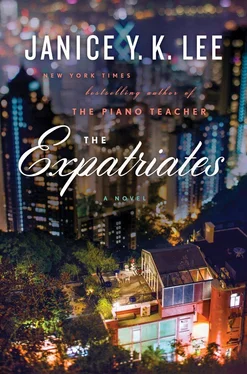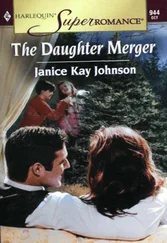Margaret tenses, waiting for the next question. She has cultivated a very accurate sense of when it might come in an introductory conversation.
“And children? Have any?”
She looks down at the menu. “I’ve never been here. What’s good? I’m starving.”
Priscilla takes it in stride. “The chopped salad, the Hainan chicken. Everything is good here.”
“Oh, lovely. Chopped salad!”
They murmur the conversational inanities and order from the waiter.
“So how does this work?” she asks, after they have ordered. “I’ve never used someone like you before.”
“You tell me what you want, I try to make it happen.”
“You can guide me, though.”
“Of course. This is for your husband’s fiftieth, is that right?”
“Yes, in May.”
“Any ideas on themes or what he’d like?”
“Half-life?” She laughs, but Priscilla does not. “Mid-century?”
Priscilla has taken out a big yellow pad on which she writes “Clarke Reade’s 50th birthday” with a Sharpie. She looks up, all business. Margaret wonders why she always thinks everything seems absurd. Like it seems absurd to write the client’s name and event on a yellow legal pad. With a Sharpie. No one else seems to find it the least bit strange.
“Thoughts?” Priscilla tries again.
“I haven’t the slightest idea, I’m afraid,” Margaret says. “Is there something you can suggest?”
After going over possible themes and venues and dates, they get the check. Margaret opens her bag, unsure of the protocol, but Priscilla waves her away. As they take leave of each other, Priscilla asks again. “Do you have children?”
Margaret gathers her jacket from the back of the chair, where she has hung it.
“Yes,” she says. “They’re at TASOHK, you know, the American school.” She nods, looks away, past Priscilla and her bright smile.
And that’s it. She has survived the moment. She walks quickly to the glass doors of the hotel lobby and pushes through to the cool air outside. She gulps and breathes.
HONG KONG was supposed to have been a new start — if one could say one needed a new start at the age of twenty-four, which is how old she was when she came, three years ago. It is safe to say that life has not turned out the way Mercy thought it was supposed to.
But she cannot say she wasn’t warned. Her mother came home ashen-faced one day when Mercy was thirteen. She wouldn’t tell Mercy what had happened, but her father, dependably drunk and abrasive in the evenings, told her the bad news. Superstitious mother had gone to a fortune-teller to waste his money and find out about Mercy’s future. Idiot fortune-teller had clucked his tongue at her reading, said he had rarely seen someone whose life would be so muddled. She would have bad luck. Things would always go topsy-turvy. She was not a bad person, but things would never go her way. Understand? Her father poured some more whiskey, face already tomato red.
Korean ajumma , busybodies that they were, were all amateur fortune-tellers themselves and liked to read faces. One Sunday, at their church in Queens, she had overheard her mother’s friends talking about the composition of her face having no bok , no good fortune. Thin, jutting eyebrows, cheekbones that were too sharp, a chin that was so pointy it would cut away all the good. She’s pretty, one said. Pretty in a cheap way, said another. That makes it worse. That will invite the bad luck. And the bad men.
Later, she found the fortune-teller’s predictions in her mother’s underwear drawer. She recognized the characters of her name and opened the red paper booklet. It was written in Korean and Chinese characters, so she couldn’t read it, but she took it out and asked a Korean man, a stranger on the street, what it meant. In Flushing, where they lived, it was almost like living in Seoul, there were so many Koreans. The man gave her an odd look but translated a few lines.
“This means, you are riding a fast horse with no saddle. The rider will fall.” He hesitated. “And here it says, a crow cannot soar like an eagle.” His eyes dropped, and he handed the book back to her. “I have to go.”
A crow cannot soar like an eagle .
It was always there in the back of her mind, but what did you do with a fate like that but dismiss it as old Korean folklore that had nothing to do with her?
At Columbia, she had been disheartened to see how hard it was to do well, to stand out. When she got in, she thought, I’ll show those Korean ladies who has bad fortune. But it was harder than that. In her freshman class alone, there had been an Oscar-nominated actress, a boy who’d had two poems published in the New Yorker , someone who had sailed around the world and been written up in National Geographic .
And this is the thing too. In college, Mercy had gone above her station, as she thinks of it in gloomier moments. Perhaps this was part of her misfortune. There was a whole new kind of person there, people she had seen in movies and read about in books. Rich people; really, really rich people. Kids who had drivers, who had never done a load of laundry, whose parents had private planes. Her own parents were not dry cleaners or deli owners, as some curious new “friends” had asked. Her dad had an unsuccessful import/export company with an office that was always littered with samples of ugly, Korean-made poly sports apparel, and her mom, long-suffering, helped out at her aunt’s Korean restaurant and told Mercy she had only one child because she could see that life wasn’t going to get any better. Mercy never apologized about her family but never volunteered information either.
Mercy never knew why she was included in this new crowd. An accident, she thought, born of the fact that she was pretty, looked surprisingly good in a forty-dollar strapless dress from Forever 21, was always up for a dare, and that her freshman-year roommate was a friendly, pudgy Chinese girl from Hong Kong, who went downtown one Saturday in October and bought a cherry-red Mercedes convertible and whose parents had a three-bedroom pied-à-terre on East Seventy-fourth Street. Philena was a homely, uncomplicated rich girl who liked to have lots of people around, always, and included Mercy without drama, paying for everything with her black American Express card.
That first year of university, Mercy studied her classmates, the rich ones, a special breed unto themselves. She noted the soft, flabby skin of the boys, their whiskey breath, the petulant way they talked to their mothers, the way things always got sorted for them. They came from all over the world: Abdul, from Saudi Arabia, who went to London every weekend and would sometimes invite a girl from school, who would come back with six new pairs of shoes and a dress from Harrods and a story about a party at Elton John’s country house, although privately Mercy thought the whole thing made them little better than escorts; or Cal, from LA, whose father was a director and who hung out with Julianne Moore on the weekends; or the boys from Manhattan, so many of them, with their hedge fund fathers, bony, raspy-voiced mothers, and limitless credit cards. The rich boys were thin-skinned, with a puffed-up bravado that was millimeters thin; if you nicked it, they collapsed.
Mercy borrowed Jimmy Choos from Philena and went to the apartments of upperclassmen (oh, the irony of that term!) in doorman buildings, where you walked in to the heady smell of pot and dirty laundry and the drone of some basketball game always in the background. There were half-empty bottles of Johnnie Walker and Jim Beam on the Corian kitchen counters, props for an always ongoing party. The boys were pigs in the way they lived, whereas the girls were princesses.
Читать дальше












